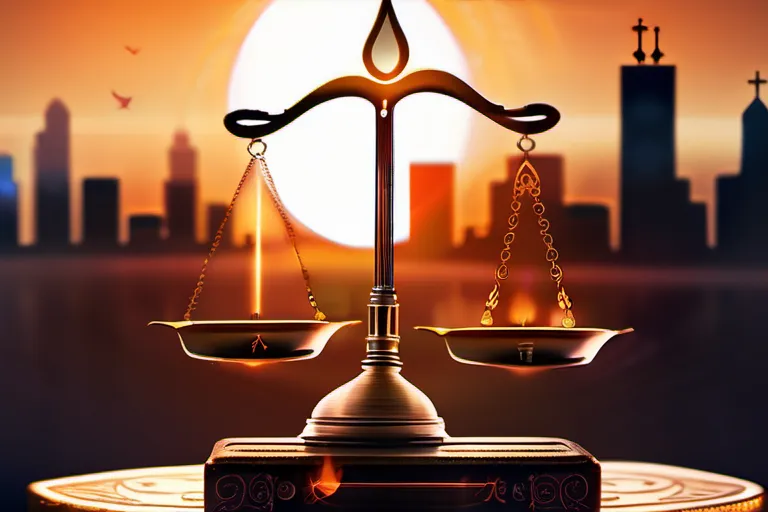Exploring the controversial viewpoints on the dangers of religion
Religion has been a significant part of human history, shaping societies and cultures for thousands of years. However, some individuals argue that religion can be harmful, leading to conflict, intolerance, and even violence. In this article, we delve into the reasons why some people think religion is dangerous.
The historical context of religious conflict
Why do some people think religion is dangerous? It’s a question that has puzzled many, as religion often serves as a source of comfort and guidance for billions worldwide. Yet, history offers us stark reminders where religion has been wielded like a double-edged sword, cutting both ways with deadly consequences. Take the Crusades, for instance—holy wars in which Christian knights set out to reclaim Jerusalem from Muslim control, but ended up sowing seeds of religious and ethnic strife that still resonate today.
Similarly, the Thirty Years’ War was a complex conflict where religious differences were just one of many factors, yet religion played a pivotal role. This war, primarily fought in Central Europe between 1618 and 1648, devastated much of the region and left deep scars that have influenced European history for centuries. The religious fervor that drove these conflicts was not just about spiritual belief but also about political power and territorial control.
These historical contexts paint a picture where religion can serve as both an agent of unity and division. It’s like a powerful river that flows through societies, sometimes nourishing the land with its abundant waters, other times causing floods that destroy everything in their path. The question then arises: Can we harness this power for good or will it inevitably lead to conflict?
The answer, as history shows us, often depends on how religion is interpreted and applied. When religion is used to foster mutual respect and understanding among different communities, it can be a force for peace and unity. However, when it’s manipulated by those in power to incite fear and hatred, the results are catastrophic. As we reflect on these historical conflicts, it becomes clear that while religion itself may not be dangerous, the way humans interpret and apply its teachings certainly can be.
The impact of religious intolerance
When we delve into the historical context of religious conflict, one cannot help but ask: why do some people think religion is dangerous? The answer lies in deep-rooted fears and misunderstandings that have echoed through time, often fueling hatred and intolerance.
‘Is it not ironic how those who seek peace are frequently the ones labeled as threats?’
The Inquisition stands as a stark example of religious intolerance. During this period, people were accused of heresy or witchcraft and subjected to persecution, torture, and even execution. The Church, in its quest for orthodoxy, often became the harbinger of fear rather than a beacon of hope. It’s as if a once-compassionate light had been dimmed by the shadows cast by intolerance.
Fast forward to modern times, and we see similar patterns. Minority religions face discrimination and persecution in various parts of the world. In some regions, they are ostracized or even attacked simply because their beliefs differ from the prevailing religion. This is not just about individual freedom but about communities feeling marginalized and threatened.
- How can a society that prides itself on tolerance turn its back on those who seek solace in different faiths?
- Doesn’t religious diversity add richness to our cultural tapestry, rather than posing a danger?
The impact of such intolerance is far-reaching. It not only divides communities but can also lead to cycles of violence and hatred that are hard to break. The question lingers: Can we truly achieve harmony when we treat others based on their beliefs instead of embracing the diversity of human thought?
The lessons from history remind us that while religion has often been a source of conflict, it can also be a powerful force for good and understanding. It’s up to us to choose how we interpret its teachings and whether we use them as tools for division or unity.
Religion and extremism: A dangerous combination
Why do some people think religion is dangerous? One might ask, isn’t religion meant to bring comfort and solace in times of need? But when certain interpretations of religious texts are taken to extreme lengths, it can lead to a dangerous cocktail: extremism and terrorism. How does this happen?
The answer lies in the interpretation and application of these texts. Imagine a recipe that can be cooked in countless ways; one chef might make a simple, delightful meal, while another turns it into something completely different. In the same vein, religious texts can be interpreted in various ways. However, when a particular group insists on an ultra-conservative or literal interpretation, they may justify extreme actions under the guise of religious duty.
Think about a forest where different paths lead to the same destination. For some, taking one path might seem right, but for others, it could be dangerous and even lead them astray. Similarly, certain religious groups focus on specific passages or teachings that they believe dictate how to live every aspect of life, including dealing with those who don’t share their beliefs.
When these interpretations are fused with radical ideologies, the result can be a justification for violence against perceived enemies. This has led to various instances of extremism and terrorism in different parts of the world. How do we navigate this complex terrain? Can moderate voices within religious communities counteract these dangerous interpretations?
The challenge is not just about understanding religion but also about recognizing how it can be co-opted for extremist goals. It’s a delicate balance between respecting cultural and religious diversity while ensuring that no one uses faith to promote harm.
The role of religion in modern politics
Why do some people think religion is dangerous? It’s a question that has stirred heated debates and ignited passionate discussions around the globe. Is it not supposed to be a source of comfort, guidance, and unity? How can something meant to uplift humanity become a tool for division and conflict?
The answer lies in the complex interplay between faith and power. Religion, when intertwined with politics, can often serve as a rallying cry or a means to gain political leverage. Politicians may use religious symbols and rhetoric to win support, creating a powerful combination that can sway public opinion and influence policies. This strategy is not new; throughout history, rulers have manipulated religion for their own benefit, drawing on its deep-seated influence in people’s lives.
Consider the concept of a ‘religious state.’ In such a context, religious leaders hold significant political power, potentially leading to laws and policies that may not reflect the broader societal values or needs. This can result in a clash between secularism and religious fundamentalism, where the latter seeks to enforce its interpretations on all aspects of public life. Such a scenario can breed tension and conflict, as different groups seek to assert their own values and beliefs.
Moreover, when religion is used for political gain, it can overshadow critical issues such as human rights, social justice, and economic development. By focusing on religious doctrines or interpretations that may be outdated or harmful, leaders might divert attention from pressing problems affecting the common people. This not only diminishes the effectiveness of governance but also perpetuates inequalities and suffering in society.
So, when we ask why some people think religion is dangerous, we must consider its role in modern politics. The misuse of religious power can lead to harmful outcomes, whether through extremist ideologies or rigid dogmas that limit individual freedoms. It’s a stark reminder of the delicate balance between faith and governance, where one misstep can have far-reaching consequences.
Ultimately, it is up to us as individuals and communities to ensure that religion remains a force for good in society, free from the constraints of political manipulation or harmful practices. Only then can we truly harness its potential to bring about positive change and promote understanding among diverse populations.
Religious dogma and its potential for harm
Religious dogma, with its rigid adherence to doctrines and principles, can sometimes become a double-edged sword. How many times have we heard about practices like female genital mutilation (FGM) being justified in the name of religion? Is it not a stark reminder that when religious teachings are interpreted too strictly or narrowly, they can lead to harmful outcomes? Imagine FGM as a metaphor for a deep cut inflicted on the body of society – it’s a practice rooted in cultural traditions often sanctified by religious beliefs. Why do some people think religion is dangerous? Because when faith becomes an excuse for violence or injustice, it can indeed turn into a perilous force.
Honor killings are another chilling example where the strict application of religious laws leads to devastating consequences. These crimes are often rationalized under the guise of upholding honor and moral standards, but they serve only to perpetuate cycles of violence and oppression. How many times must we question whether these interpretations align with the core teachings of compassion and love that most religions espouse? It’s a sobering thought to ponder why such practices persist in the name of religion.
The potential for harm is not limited to physical harm alone; it extends to the psychological and emotional well-being of individuals. When religious dogma becomes inflexible, it can stifle personal growth and innovation, trapping people in rigid frameworks that don’t allow for individual freedom or adaptation. Is this really what religion was meant to be? A prison or a sanctuary?
The question then arises: How do we navigate the complex interplay between faith and society when some practices can be so harmful? It’s clear that not all religious doctrines are inherently dangerous, but it’s crucial to critically examine how they are practiced and interpreted. In many cases, it’s the rigid application of these teachings that leads to perilous outcomes. We must foster a dialogue where interpretations are flexible enough to accommodate diverse perspectives while still respecting cultural traditions.
In conclusion, while religion can offer solace and guidance, it’s essential to recognize the risks when religious dogma is used as an excuse for harm. By promoting open discourse and critical thinking, we can work towards a more inclusive and less dangerous understanding of religion in our societies.
Finding balance: The positive aspects of religion
Why do some people think religion is dangerous? It’s a question that has sparked intense debate and discussion. Could it be that religion, like any system of beliefs, can sometimes veer into dangerous territory when its followers become overly dogmatic or extreme?
Take the metaphor of a river: just as water flows naturally and provides life to many, so too does religion offer moral guidance, community support, and spiritual fulfillment. However, just as a dam can control that flow, leading to flooding if not properly managed, rigid adherence to religious doctrines can similarly turn into something destructive.
One of the most significant benefits of religion is its role in fostering community building. Imagine a garden: each flower, like a person in a community, brings unique beauty and purpose. Together, they form a vibrant, diverse ecosystem. Religious communities often serve as a nurturing ground where individuals find belonging, support, and a sense of identity.
Moral guidance is another crucial aspect. It’s akin to a lighthouse guiding ships through turbulent waters. Religion can provide a framework for ethical living, helping people navigate life’s challenges with integrity and compassion. This guidance isn’t just about avoiding sin; it’s about cultivating virtues like kindness, honesty, and empathy.
Personal spiritual growth is another profound benefit. It’s as if religion offers a map to self-discovery, leading individuals through the maze of their souls. Through prayer, meditation, and reflection, people can gain deeper insights into themselves and their place in the world. This journey often leads to greater resilience, inner peace, and a sense of purpose.
However, it’s important to recognize that not all religions are created equal in their positive impact. The way doctrines are interpreted and practiced plays a significant role. Just as some rivers can be tainted with pollution, leading to harm rather than nourishment, certain religious practices or interpretations might lead individuals astray from the path of righteousness.
So, why do some people think religion is dangerous? Perhaps it’s because we need to ensure that this source of strength and guidance remains pure and beneficial for all. By fostering open dialogue and understanding, we can work towards harnessing the positive aspects of religion while mitigating any potential risks.
Conclusion
 While it’s important to acknowledge the potential dangers associated with religion, it’s also crucial to remember that religion can bring about unity, peace, and a sense of purpose for many individuals. This article aims to provide a balanced perspective on the topic, encouraging open-mindedness and understanding.
While it’s important to acknowledge the potential dangers associated with religion, it’s also crucial to remember that religion can bring about unity, peace, and a sense of purpose for many individuals. This article aims to provide a balanced perspective on the topic, encouraging open-mindedness and understanding.











